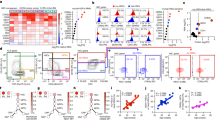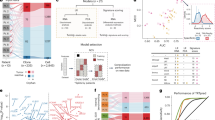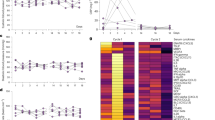Abstract
A central problem in improving the success of renal transplantation in humans is to discover how to induce in the recipient an active immunological unresponsiveness to the donor's alloantigens1–3. There is increasing evidence that immunological unresponsiveness can be induced by either suppressor T cells4,5 or antibodies directed against the T-cell receptor, that is, anti-idiotypic antibodies6,7. In our institutes, there are now six successful renal recipients. One of these, CD-S5, is a 32 year old man, HLA tissue-typed as Aw31, Bw39, Bw54 and DRw4. He received a second kidney transplant from a cadaveric donor having HLA-A2 and B5 on 21 August, 1975, after the first transplant from his brother with Aw26 and Bw40 had been rejected. The stimulation index of the mixed lymphocyte reaction (MLR) between patient and first donor was 11.9 but MLR could not be tested in the second grafting. One year after the second graft, immunosuppressive treatment with azathioprine was withdrawn because of drug toxic hepatitis. In spite of the administration of only prednisolone at 10 mg per day for the past 3yr, the patient's creatinine clearance has remained at 70 ml min−1. We proposed that the long survival of the renal graft might be due to an immunological unresponsiveness induced by the host immunoregulatory mechanism of this patient. To test this possibility, we have investigated the patient's serum for factor(s) capable of suppressing the host immune response. We report here our finding that the patient's serum contained an antibody against a T-cell receptor for a certain MLR, which was capable of specifically inhibiting a certain MLR.
This is a preview of subscription content, access via your institution
Access options
Subscribe to this journal
Receive 51 print issues and online access
$199.00 per year
only $3.90 per issue
Buy this article
- Purchase on Springer Link
- Instant access to full article PDF
Prices may be subject to local taxes which are calculated during checkout
Similar content being viewed by others
References
Terasaki, P. I., Opelz, G. & Ting, A. in Immunological Aspects of Transplantation (ed. Calne, R.) 92–111 (Wiley, New York, 1973).
Kilshaw, P. J., Brent, L. & Dinto, M. Nature 225, 489–491 (1975).
Binz, H. & Wigzell, H. Nature 262, 294–295 (1976).
Gershon, R. K. & Kondo, K. Immunology 21, 903–914 (1971).
Basten, A., Miller, J. F. A. P., Sprent, J. & Cheers, C. J. exp. Med. 140, 199–211 (1974).
Strayer, D. S., Cosenza, H., Lee, W. M. F., Rowley, D. A. & Könler, H. Science 186, 640–643 (1974).
Eichman, K. Eur. J. Immun. 5, 511–517 (1975).
Binz, H. & Wigzell, H. J. exp. Med. 142, 197–211 (1975).
Ramseier, H., Aguet, M. & Lindenmann, J. Immun. Rev. 34, 50–88 (1977).
Binz, H. & Askonas, B. A. Eur. J. Immun. 5, 618–623 (1975).
Häyry, P., Anderson, L. C., Nording, S. & Virolainen, M. Transplantn Rev. 12, 91–140 (1972).
Krammer, P. H. J. exp. Med. 147, 25–38 (1978).
Nissonoff, A. & Bangasser, S. Transplantn Rev. 27, 100–134 (1975).
Capra, J. D. & Michael, K. J. Proc. natn. Acad. Sci. U.S.A. 71, 4032–4036 (1974).
Krawinkel, U., Cramer, M., Melchers, I., Imanishi-Kari, T. & Rajewsky, K. J. exp. Med. 147, 1341–1347 (1978).
Mozes, E. & Haimovich, J. Nature 278, 56–57 (1979).
Jerne, N. K. Annls Inst. Pasteur, Paris 125C, 373–389 (1974).
Andersson, L. C. et al. J. exp. Med. 146, 1124–1137 (1977).
Author information
Authors and Affiliations
Rights and permissions
About this article
Cite this article
Miyajima, T., Higuchi, R., Kashiwabara, H. et al. Anti-idiotypic antibodies in a patient with a functioning renal graft. Nature 283, 306–308 (1980). https://doi.org/10.1038/283306a0
Received:
Accepted:
Issue Date:
DOI: https://doi.org/10.1038/283306a0
This article is cited by
-
Clinical significance of in vitro donor-specific hyporesponsiveness in renal allograft recipients as demonstrated by the MLR
Transplant International (1994)
-
T cell regulation, anti-idiotypic immunity, and the nephritogenic immune response
Kidney International (1983)
Comments
By submitting a comment you agree to abide by our Terms and Community Guidelines. If you find something abusive or that does not comply with our terms or guidelines please flag it as inappropriate.



